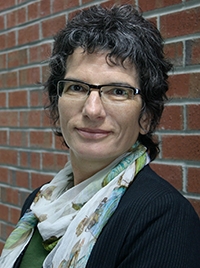Pascal Professor 2015
In 2015 the Pascalchair of the Faculty of Science, Universiteit Leiden and in particular of Leiden Institute of Advanced Computer Science, is held by Prof. Dr. Natasa Jonoska, University of South Florida, Tampa, USA.

Dr. Jonoska is a Professor at the Department of Mathematics and Statistics at University of South Florida in Tampa, Florida, USA. Her research interests are in theoretical and computational models of molecular self-assembly and molecular biology. For the last 15 years she has had extensive research collaborations with experimentalists in molecular biology and structural DNA nanotechnology. She is a Fellow of the American Association for the Advancement of Science and has been awarded the Rozenberg Tulip Award in DNA Computing and Molecular Programming by the International Society for Nanoscale Science and Computing. She holds Bachelor of Science degrees in both mathematics and computer science from the University of `Cyril and Methodius' in Skopje, Macedonia and a Ph.D. degree in Mathematical Sciences from the Binghamton University in New York. Currently, she serves as a Chair of the Steering Committee for the annual DNA Computing and Molecular Programming conference and also co-chairs the steering committee of the Unconventional Computing and Natural Computing conference. She serves on editorial boards of several journals, including Theoretical Computer Science, Natural Computing, Computability, International Journal of Foundations of Computer Science, and has edited several books on these topics.
In 2015 Professor Jonoska spends two research visits in Leiden: first in May/June and after that in October/November.
On Tuesday October 27 at 15.30 hrs in room 412 ( Snellius Building) she will give the Pascal lecture entitled:
Computation by molecular self-assembly
Simple rules of local interactions can guide molecular building blocks into larger arrangements that build complex structures without external mediation, a process known as self-assembly. These local molecular interactions, viewed as information processing operations, "compute’', in the sense of computation theory, the build-up of the assembled structures. The bottom-up assembly, in particular DNA based self-assembly, has achieved grand progress in the past 15 years. In search of understanding molecular information processing, DNA self-assembly has shown to algorithmically build complex structures, assemble complex molecules as a result of computation, produce nano devices, and scaffold algorithmic assembly of other metallic particles.
In this self contained presentation we will introduce the basic principle of algorithmic DNA self-assembly and discuss its challenges and advantages. We will show that viewing self-assembly as computation leads to an interdisciplinary progress. The theory of computation approach contributes to a better understanding of the nature of self-assembly, while viewing the molecular interaction processes as computation provides novel and challenging models of computing that can guide experimental designs.
You are cordially invited to attend this lecture.
Prof. Jonoska is hosted by: Prof. Dr. Grzegorz Rozenberg and Prof. Dr. Joost N. Kok.
